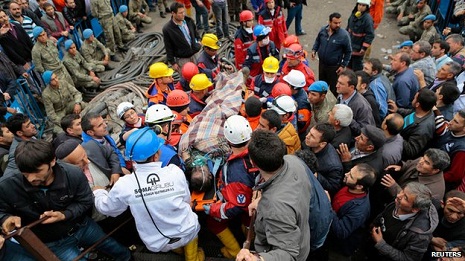“The Soma trial of mine company employees offers victims a chance to get some measure of justice, but the trial does not address the responsibility of state agents who failed in their duty to protect mine workers’ lives,” said Emma Sinclair-Webb, senior Turkey researcher at Human Rights Watch. “The government’s role in the Soma disaster needs to be investigated and corrected if Turkey is going to be able to reverse its terrible record of preventable mine accidents.”
The criminal investigation into the mine disaster revealed compelling evidence of dangerous working conditions and inadequate infrastructure. Prosecutors found that the mine company had been informed of but apparently ignored clear warning signs of dangerous gas (firedamp) levels and rising heat in the mine, all of which contributed to the deaths.
Soma miners and relatives of miners who died in the accident described to Human Rights Watch the working conditions at the Soma Eynez mine in the years before the disaster. They cited a pattern of ineffective inspections; lack of implementation of health and safety standards; and infrastructure, equipment, and materials inadequate for the large number of mine workers. Those interviewed repeatedly noted the mine company’s emphasis on maximizing production of coal, apparently at the expense of safety.
“The prime minister called the accident fate, said it was in the nature of the job, but they won’t make any of us see it that way,” said one retired miner whose son died in the disaster. “It was a massacre. It could have been prevented, and the state is protecting itself.”
The trial in the Akhisar Heavy Penal Court includes charges ranging from “killing with probable intent” to “criminally negligent manslaughter” and “constructive manslaughter.” The defendants include managers and senior technical personnel as well as the head of the board of the company. Eight of the defendants are in pretrial detention.
Prosecutors in the Soma Eynez case commissioned a detailed expert report on the disaster that provided the basis of the indictment against the company officials. The expert report also attributes responsibility for the disaster to state inspectors and institutions with monitoring powers responsible for multiple failures in their duty of oversight.
But the ministers of labor and social security and of energy and natural resources withheld permission to pursue a criminal investigation against officials. They were able to block an investigation based on a controversial law which states that prosecutors need administrative permission to investigate state officials for offenses committed in the course of their public duties.
“It is deeply troubling that the government can block prosecutors’ investigations into state officials for criminal wrongdoing by invoking an old law on administrative permission,” Sinclair-Webb said. “The European Court has in the past raised concerns that this law contributes to impunity for crimes by public officials and urged Turkey to repeal it.”
The Soma mining disaster has starkly exposed Turkey’s harsh and illegal working conditions in mining and other hazardous industries. In August 2014, 18 miners also died in a mine accident in Ermenek, in southern Turkey, and deaths on construction sites occur frequently. The most recent combined official statistics from Eurostat and Turkey’s Social Security Institution in 2011 reveal that the number of deaths in workplace accidents in Turkey was 15.4 per hundred-thousand workers as compared with 2.6 in the 28 EU countries. Mine accidents represent a significant proportion of those deaths in Turkey.
Turkey’s laws and regulations pertaining to mining stipulate health and safety standards and hold government ministries and state institutions responsible for regular inspection and oversight. But the Soma disaster has revealed the shocking lack of implementation of laws and standards to protect workers, Human Rights Watch said.
“When it comes to mining and other hazardous work, the government duty to uphold health and safety in the workplace is a right-to-life issue,” Sinclair-Webb said. “So it is all the more critical for the government to meet its obligation to investigate and hold to account state agents responsible for the Soma disaster. New regulations are not enough.”
The Search for Justice
Human Rights Watch conducted interviews in the towns of Soma and nearby Kınık and interviewed families of four mine workers who died in the May 13 disaster, nine Soma mine workers, a trade unionist, a lawyer, and a human rights activist. Two of the miners did not want to be identified at all out of concern that they might not get jobs again for speaking out. Others are identified here by their initials.
Relatives of miners who died described their search for justice and of the difficulty of coming to terms with the loss of sons, brothers, and husbands. Their political outlooks varied but their analysis of the causes of the disaster was consistent and matched the findings in the expert report.
A recurring element of their accounts of the disaster and rescue effort was their concern that the mine and its managers prioritized high productivity over obligations to uphold the health and safety of the workforce, and that the state authorities charged with oversight and inspection were fully aware of the situation but ignored it.
More about:
























-1745485667.jpg&h=190&w=280&zc=1&q=100)























